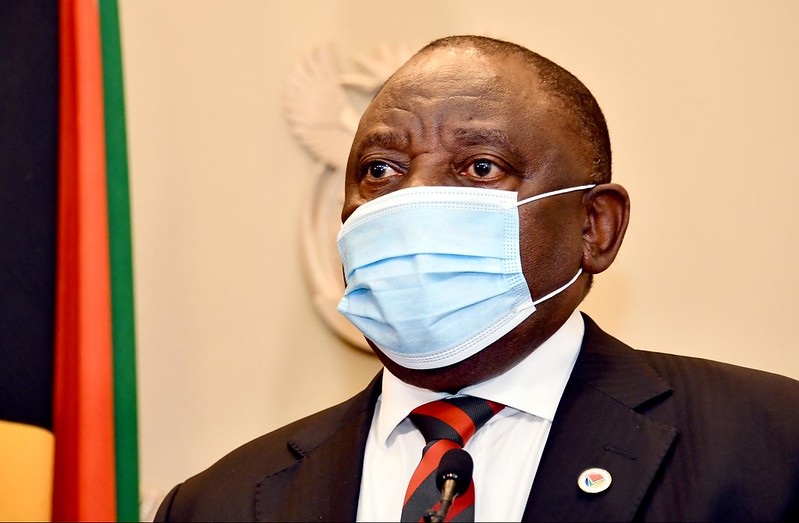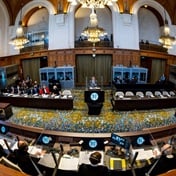
- The president has urged people not to attend funerals unless absolutely necessary, leaving goodbyes for later.
- Economists have warned that further lockdown restrictions will damage the economy.
- There were no further measures to rein in economic activity and the closure of land borders still allows for trade.
Funerals have become a Covid-19 death trap and for now it is safer to stay at home, President Cyril Ramaphosa warned as he addressed the nation on Monday night.
His update on lockdown restrictions came amid a record number of Covid-19 infections, deaths and hospitalisations, with 15 046 new infections and 416 new deaths recorded by Monday.
Economists have warned that tighter lockdown restrictions will set back the economic recovery which started in the third quarter of last year. Consequently, the small changes Ramaphosa announced to the adjusted Covid-19 alert Level three largely did not restrict economic activity further.
Just three days before, at the ANC's 109th birthday celebration delivered online, Ramaphosa promised the governing party would see to the implementation of an economic reconstruction plan this year. The plan was devised last year and was supposed to follow on the hard lockdown that lasted from March to August last year.
"Economic recovery and reconstruction are as important as protecting the health of our nation," Ramaphosa said on Friday night, adding that the party was now focusing on "aggressively implementing" its economic reconstruction and recovery plan.
The only thing left for Ramaphosa on Monday night was to warn South Africans to "each make a deliberate decision to avoid any unnecessary contact with people", and to provide a glimmer of hope by promising that vaccines have been secured and are on their way.
'Super-spreader' events
With the death toll reaching all-time highs in the past few weeks – 4 600 people have died in the first 10 days of this year alone – funerals have tragically turned out to be "super-spreader" events.
Up to 50 people are allowed to attend a funeral, but – lost in grief and bound by certain rites – for many it has been difficult to adhere to cold, stringent regulations.
Providing a fitting send-off for loved ones is part of people's culture, Ramaphosa said, but he warned that some of the rituals performed at funerals and in the run-up could not continue.
"We are in the deadly grip of a pandemic and all these things that would normally take place are just increasing our exposure to risk," he said.
Ramaphosa veered off-script to explain that many people were repeatedly reporting that many of those who have died were infected at funerals.
"Let us pay heed to this," he said.
He said:
With a series of consultations behind him this past week – including within the ANC and its alliance partners – Ramaphosa could give a more extensive update on South Africa's efforts to acquire a vaccine.
Just over a week ago, there was little clarity, amid some worst-case scenario speculation that South Africa had missed the boat completely and might not get vaccines this year at all.
Health Minister Zweli Mkhize last week announced that South Africa secured 1.5 million vaccine doses from the Serum Institute of India. On Monday night, Ramaphosa announced that in total, 20 million vaccine doses will be delivered "mainly in the first half of this year".
It's not clear where these or the total number of vaccine doses would come from to cover 67% of the population, or 40 million people, as Ramaphosa announced, but he promised updates "as we conclude our negotiations with vaccine manufacturers".
Frontline health workers, essential workers like teachers, police officers and municipal workers and those in old age homes, prisons, and shelters, will get vaccinated first, as will those older than 60 or people with comorbidities.
'Extensive' vaccine programme
A national committee has been established to deal with the distribution of vaccines, Ramaphosa said, adding that it will be "the largest and most complex logistical undertaking in our country's history".
He added:
It will also require cooperation from all spheres of government, all sectors of society and all citizens and residents, he said – a hint that foreign nationals will have to be included in the strategy.
Even as South Africa's recorded Covid-19 infections, deaths and hospitalisations are at their highest since the first recorded case here in March last year – and even as the new coronavirus variant is spreading more rapidly than the original one – government on Monday made no effort to rein in economic activity further.
The one big exception was the alcohol ban, which remains in place due to the strain alcohol-related trauma cases place on hospital facilities, Ramaphosa said.
ALSO READ | Alcohol sales ban extended to limit trauma cases at hospitals
Movement through South Africa's 20 land borders is set to be restricted largely to trade and business, as well as to those with documents to reside in South Africa, with the aim of reducing snarl-ups like those at the Beitbridge and Lebombo border posts the past couple of weeks.
Many people have been exposed to Covid-19 infections while waiting for tests or for their paperwork to be processed to enter South Africa, Ramaphosa said.
ALSO READ | Lockdown: SA shuts 20 land ports of entry amid growing risk of Covid-19 infections
Investec chief economist Annabel Bishop said the targeting of social interactions in the adjusted Level 3 regulations was a "less damaging path" to take than a hard lockdown – Level 4 and Level 5 – on the economy.
Bishop said the continued focus on social interactions rather than economic activities in the restrictions was important given that the economy was still "extremely weakened and still fragile".
Did you know you can comment on this article? Subscribe to News24 and add your voice to the conversation.




 Publications
Publications
 Partners
Partners























